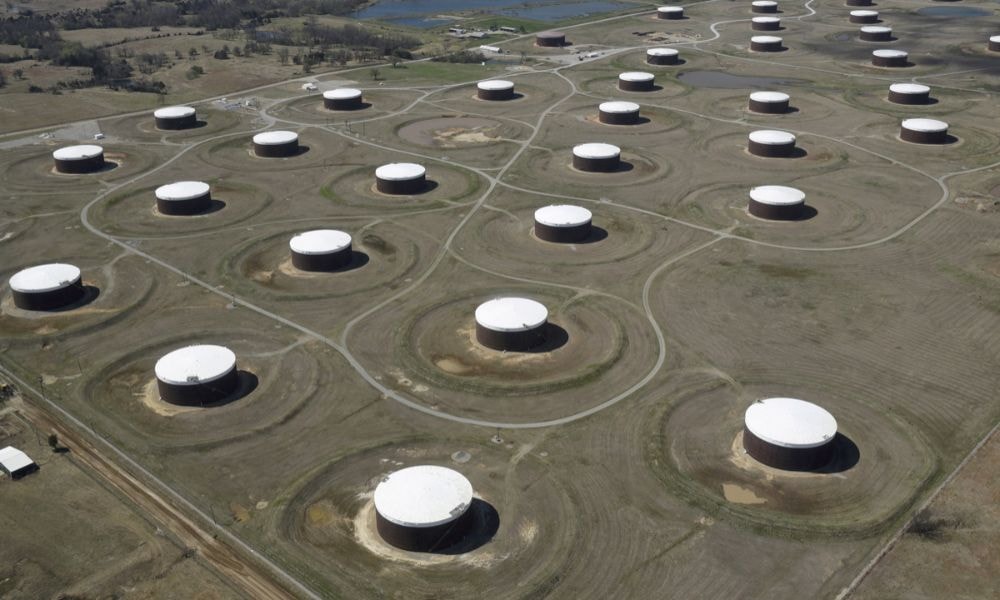Oil Prices Settle Higher Amid Supply Concerns Heading Into Winter

Oil prices settled higher on Monday, shaking off weaker demand expectations as supply concerns mount heading into the winter.
Brent crude futures settled up $1.16, or 1.3%, at $94.00 a barrel. U.S. West Texas Intermediate crude settled up 99 cents, or 1.1%, at $87.78.
U.S. emergency oil stocks fell 8.4 million barrels to 434.1 million barrels in the week ended Sept. 9, its lowest level since October 1984, according to data released on Monday by the U.S. Department of Energy (DOE).
U.S. President Joe Biden in March set a plan to release 1 million barrels per day over six months from the Strategic Petroleum Reserve to tackle high U.S. fuel prices, which have contributed to soaring inflation.
The Biden administration is weighing the need for further SPR releases after the current program ends in October, Energy Secretary Jennifer Granholm told Reuters last week.
Global oil supply is expected to tighten further when a European Union embargo on Russian oil takes effect on Dec. 5.
The G7 will implement a price cap on Russian oil to limit the country's oil export revenue, seeking to punish Moscow over the invasion of Ukraine, while taking measures to ensure that oil could still flow to emerging nations.
The U.S. Treasury, however, warned that the cap could send oil and U.S. gasoline prices even higher this winter. [nL1N30I0BQ
The EU's executive European Commission is due on Wednesday to unveil a package of measures to help power firms facing a liquidity crunch.
France, Britain and Germany on Saturday said they had "serious doubts" about Iran's intentions to revive a nuclear deal. Failure to revive the 2015 deal would keep Iranian oil off the market and keep global supply tight.
In more bearish news for markets, China's oil demand could contract for the first time in two decades this year as Beijing's zero-COVID policy keeps people at home during holidays and reduces fuel consumption.
"The lingering presence of headwinds from China's renewed virus restrictions and further moderation in global economic activities could still draw some reservations over a more sustained upside," said Jun Rong Yeap, market strategist at IG.
U.S. domestic oil output is also set to rise in coming months. Oil output in the Permian Basin in Texas and New Mexico, the biggest U.S. shale oil basin, is due to rise 66,000 barrels per day (bpd) to a record 5.413 million bpd in October, the U.S. Energy Information Administration (EIA) said in its productivity report on Monday.
The European Central Bank and U.S. Federal Reserve, meanwhile, are prepared to increase interest rates further to tackle inflation, which could strengthen the U.S. currency and make dollar-denominated oil more expensive for investors.
"A strong dollar would serve as a reverse correlation to commodities priced in dollars, and would likely serve as a drag on upside gains in the energy market," said Bob Yawger, director of energy futures at Mizuho.
Latest News
 car&bike Team | Feb 14, 2026Kawasaki Ninja, Versys Models Available With Discounts Of Up To Rs 2.50 LakhThe highest discount is being offered on the Ninja ZX-10R, followed by the Ninja 1100 SX and ZX-6R models.2 mins read
car&bike Team | Feb 14, 2026Kawasaki Ninja, Versys Models Available With Discounts Of Up To Rs 2.50 LakhThe highest discount is being offered on the Ninja ZX-10R, followed by the Ninja 1100 SX and ZX-6R models.2 mins read car&bike Team | Feb 14, 2026Vespa Officina 8 Launched At Rs 1.34 LakhThe Officina 8 takes inspiration from Piaggio’s historic experimental workshop in Pontedera, Italy.1 min read
car&bike Team | Feb 14, 2026Vespa Officina 8 Launched At Rs 1.34 LakhThe Officina 8 takes inspiration from Piaggio’s historic experimental workshop in Pontedera, Italy.1 min read Bilal Firfiray | Feb 12, 2026MG Majestor vs MG Gloster: What’s New, What’s Different?MG Majestor replaces the Gloster as MG’s new flagship SUV for 2026. Here’s a detailed comparison between the two.4 mins read
Bilal Firfiray | Feb 12, 2026MG Majestor vs MG Gloster: What’s New, What’s Different?MG Majestor replaces the Gloster as MG’s new flagship SUV for 2026. Here’s a detailed comparison between the two.4 mins read car&bike Team | Feb 12, 20262026 MG Majestor: Variants, Features, Specifications ExplainedThe Majestor will be offered in two key trim levels including Sharp and Savvy and in both two-wheel and four-wheel drive variants.2 mins read
car&bike Team | Feb 12, 20262026 MG Majestor: Variants, Features, Specifications ExplainedThe Majestor will be offered in two key trim levels including Sharp and Savvy and in both two-wheel and four-wheel drive variants.2 mins read car&bike Team | Feb 12, 20262026 MG Majestor SUV: In PicturesAlong with the new positioning, the SUV features a heavily updated design and styling; here’s a detailed look at it in pictures.1 min read
car&bike Team | Feb 12, 20262026 MG Majestor SUV: In PicturesAlong with the new positioning, the SUV features a heavily updated design and styling; here’s a detailed look at it in pictures.1 min read car&bike Team | Feb 12, 2026Tata Punch EV Facelift Spotted Ahead Of February 20 LaunchThe Punch EV facelift appears to be identical to the ICE counterpart.4 mins read
car&bike Team | Feb 12, 2026Tata Punch EV Facelift Spotted Ahead Of February 20 LaunchThe Punch EV facelift appears to be identical to the ICE counterpart.4 mins read
 Bilal Firfiray | Feb 12, 2026BMW X3 30 xDrive M Sport Review: The Driver’s SUV ReturnsRange-toppingX3 30 xDrive M Sport brings back the fun with 255bhp and genuine enthusiast appeal. Does this performance-focused SUV stand out?5 mins read
Bilal Firfiray | Feb 12, 2026BMW X3 30 xDrive M Sport Review: The Driver’s SUV ReturnsRange-toppingX3 30 xDrive M Sport brings back the fun with 255bhp and genuine enthusiast appeal. Does this performance-focused SUV stand out?5 mins read Bilal Firfiray | Feb 11, 2026Mercedes-AMG CLE 53 Coupe Review: The Goldilocks AMG?The Mercedes-AMG CLE 53 Coupe is a concoction of hooliganistic performance and everyday usability. Here’s why this Rs 1.5 crore two-door AMG might be the perfect modern sports coupe for India.6 mins read
Bilal Firfiray | Feb 11, 2026Mercedes-AMG CLE 53 Coupe Review: The Goldilocks AMG?The Mercedes-AMG CLE 53 Coupe is a concoction of hooliganistic performance and everyday usability. Here’s why this Rs 1.5 crore two-door AMG might be the perfect modern sports coupe for India.6 mins read Girish Karkera | Feb 11, 2026Toyota Ebella EV Review: Compact And Fun-To-Drive With The Promise Of Stress-Free AftersalesNo hiding the fact that it is a clone of the Maruti Suzuki eVitara, but the first all-electric Toyota in India is reasonably well-rounded8 mins read
Girish Karkera | Feb 11, 2026Toyota Ebella EV Review: Compact And Fun-To-Drive With The Promise Of Stress-Free AftersalesNo hiding the fact that it is a clone of the Maruti Suzuki eVitara, but the first all-electric Toyota in India is reasonably well-rounded8 mins read Bilal Firfiray | Feb 10, 2026Tata Punch EV Long Term Review: Small EV With A Big-Hearted PersonalityWith the new Punch EV Facelift just around the corner, we decided to take a look at what it excels at and what could be improved.7 mins read
Bilal Firfiray | Feb 10, 2026Tata Punch EV Long Term Review: Small EV With A Big-Hearted PersonalityWith the new Punch EV Facelift just around the corner, we decided to take a look at what it excels at and what could be improved.7 mins read Bilal Firfiray | Feb 4, 2026Volkswagen Tayron R-Line Review: Sensible Flagship For IndiaVolkswagen has introduced a made-in-India flagship SUV that offers space, comfort, performance, and German driving finesse in a practical three-row package. But is the Tayron R-Line good enough?6 mins read
Bilal Firfiray | Feb 4, 2026Volkswagen Tayron R-Line Review: Sensible Flagship For IndiaVolkswagen has introduced a made-in-India flagship SUV that offers space, comfort, performance, and German driving finesse in a practical three-row package. But is the Tayron R-Line good enough?6 mins read


























































































































